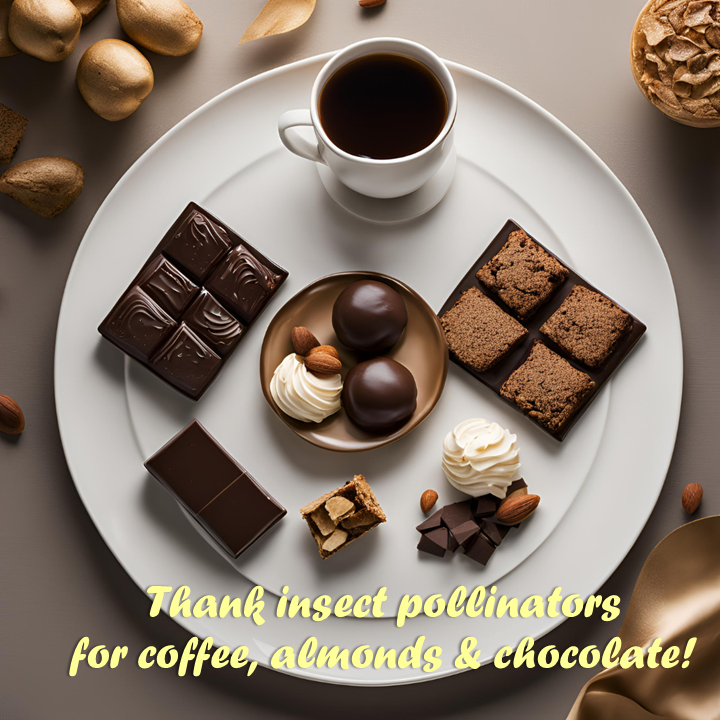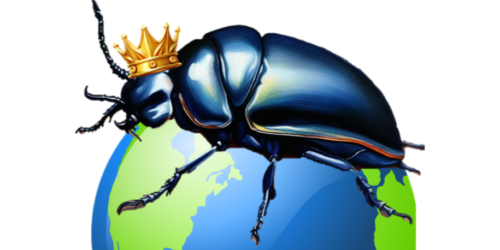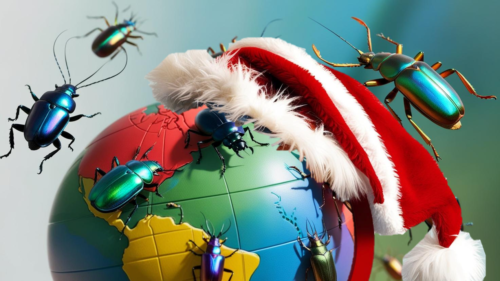Biodiversity, Insects & Ecosystem Services
When it comes to Earth’s biodiversity, insects reign supreme as the most diverse and ecologically important group of organisms on our planet. From the bustling rainforest canopies to hidden desert oases, insects provide essential ecosystem services that maintain life as we know it.
Diverse Roles of Insects
These remarkable creatures pollinate our crops, recycle nutrients, maintain soil health, and form crucial links in food webs across every terrestrial ecosystem. While their small size might make them easy to overlook, insects’ massive impact on biodiversity and ecosystem stability cannot be overstated.
In this exploration of insect diversity, we’ll discover how these six-legged marvels have become nature’s most successful innovators. Further, we’ll learn why their conservation is crucial for maintaining Earth’s delicate ecological balance.
The Numbers Game: Just How Many Are There?
Imagine throwing a party where three out of every four guests show up wearing six legs and an exoskeleton. That’s not a Halloween scenario – it’s actually a pretty accurate picture of life on Earth! Insects make up an astounding 75% of all known animal species, making them the undisputed kings of biodiversity on our planet.
When scientists try to count insects, they end up with numbers that would make even astronomers dizzy. Current estimates suggest there are around 5.5 million insect species. However, only about 1 million have been formally described (Stork, 2018). To put this in perspective, for every human on Earth, there are about 200 million insects. The order Coleoptera (beetles) alone contains over 400,000 described species. That is more than all known species of plants combined!
Nature’s Swiss Army Knife
What makes insects truly remarkable is their incredible diversity of roles in virtually every ecosystem. Here’s how these tiny titans shape our world:
The World’s Greatest Pollinators
Before you thank bees for your morning coffee, consider this: insects pollinate over 85% of all flowering plants on Earth (Ollerton et al., 2011). In extreme cases, certain plants has its unique pollinator insect species. Take for example wild figs that are pollinated by specialized fig wasp species (Agaonidae family). All in all, without insect pollinators, our breakfast tables would look drastically different – no coffee, no almonds, and definitely no chocolate!

Nature’s Clean-Up Crew
Dung beetles’ beneficial roles in nutrient cycling, soil aeration, secondary seed burial, and biological pest control are truly one-of-a-kind (Nichols et al., 2008). Wood-boring beetles and termites, especially fungus-farming macrotermitines, are essential in breaking down dead plant material in tropical ecosystems (Ulyshen, 2016). Furthermore, various carrion-feeding flies and beetles work in succession to decompose dead animals. They repurpose energy and nutrients from corpses.
The Living Buffet

Insects form the crucial middle layer of countless food webs. A single pair of breeding birds might need thousands of caterpillars to raise their chicks. When you consider that the world’s insectivorous birds consume an estimated 400-500 million metric tons of insects annually (Nyffeler et al., 2018), you start to appreciate just how vital these creatures are to life on Earth. In fact, spiders alone consume between 400-800 million tons of insects each year (Nyffeler & Birkhofer, 2017)!
Masters of Innovation
Evolution has turned insects into nature’s greatest innovators. Consider these remarkable adaptations:
- Bombardier beetles produce a boiling hot defensive spray through a chemical reaction. Human engineers are now studying for application in engines and spray technology
- The morpho butterfly’s stunning blue color comes not from pigment but from microscopic scales that create structural color. This inspires new anti-counterfeit technologies (Vukusic & Sambles, 2003)
- Desert ants, like Cataglyphis, navigate by counting their steps and tracking the sun’s position. They are demonstrating sophisticated navigation abilities that robots now emulate.
- Firefly light production systems have led to breakthroughs in bioluminescence research. This includes medical application called bioluminescence activated destruction of cancer, or BLADe.
The Canaries in Our Global Coal Mine
Perhaps most importantly, insects serve as early warning systems for environmental change. Recent studies showing declining insect populations have alerted scientists to broader ecosystem challenges. Additionally, a 75% decline in flying insect biomass over 27 years in protected areas has sparked intense discussion about the health of our ecosystems (Hallmann et al., 2017).
The United Kingdom has documented the loss of 50% of its butterfly species in agriculture-intensified areas since 1976 (Fox et al., 2015). Besides knowing butterfly status, monitoring can also help gauge the health of the environment as a whole.
Looking Ahead
As we face growing environmental challenges, understanding and protecting insect diversity becomes increasingly crucial. These tiny creatures, which many people overlook or even actively dislike, are fundamental to life as we know it. From the soil beneath our feet to the food on our plates, insects are the hidden engineers keeping our biosphere running smoothly.
The next time you spot a beetle scuttling across your path or hear crickets chirping at dusk, remember: you’re witnessing members of Earth’s most successful and diverse group of animals. They may be small, but their impact on our world is nothing short of gigantic.
Note: Read disclosures about our Content Creation Process here.





Comments (5)